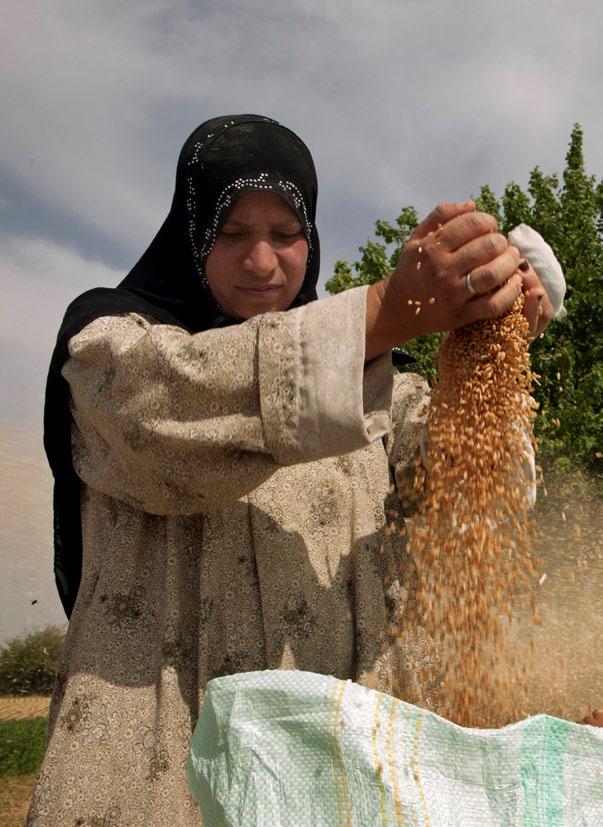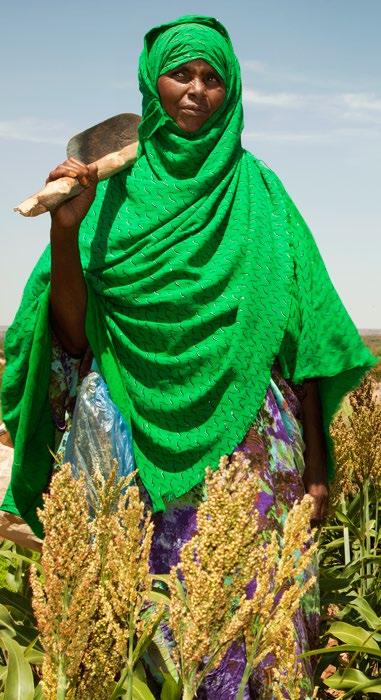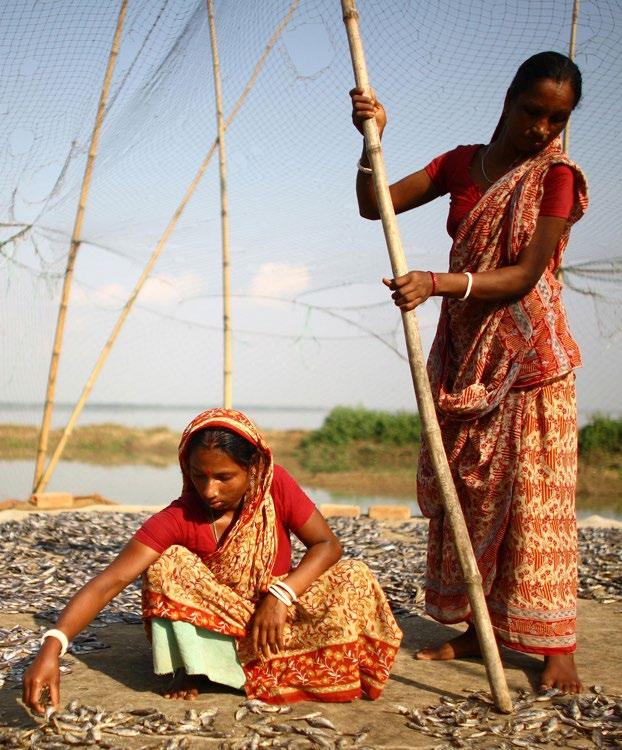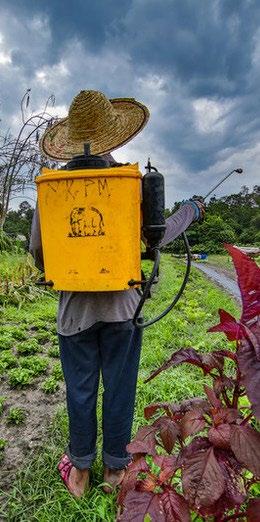Director, Private Sector
May 2024



May 2024


The International Fund for Agricultural Development (IFAD) is an international financial institution and a specialized United Nations agency dedicated to eradicating rural poverty and hunger. It does so by investing in rural people. IFAD finances programmes and projects that increase agricultural productivity and raise rural incomes, and advocates at the local, national and international level for policies that contribute to rural transformation.
The International Fund for Agricultural Development (IFAD) is an international financial institution and a specialized United Nations agency dedicated to eradicating rural poverty and hunger. It does so by investing in rural people. IFAD finances programmes and projects that increase agricultural productivity and raise rural incomes, and advocates at the local, national and international level for policies that contribute to rural transformation.
The Programme Management Department (PMD), under the leadership of an Associate Vice-President, is responsible for the overall programme of loans and grants of the Fund and is composed of five (5) regional divisions and the Private Sector Division. The five regional divisions are: Asia and the Pacific (APR), East and Southern Africa (ESA), Latin America and the Caribbean (LAC), West and Central Africa (WCA), and Near East, North Africa and Europe (NEN).
The position is located in the Private Sector Operations Division (PSD) which is responsible
for private sector investment, market diagnostic, and business development. The Director, Private Sector, works under the Associate Vice President –Programme Management Department. The structure of IFAD is currently undergoing a recalibration process and therefore the definite set-up of the Private Sector Operations Division is being finalized and is subject to confirmation of institutional process requirements. The candidate will be updated on the status during the recruitment process.
The Division works in close coordination with other divisions in the Programme Management Department and other departments, offices and divisions in IFAD. In alignment with the decentralized structure of the Fund, the division operates in a geographically distributed manner, including IFAD Headquarters and Regional Offices.
The Director, PSD works under the direct supervision of the Associate Vice President (AVP), PMD.
Location:
Rome, Italy. It is a high-level strategic office, thus the need to be based in Rome with limited flexibility on remote work. Work from home policy can 3 days from home but need to be at office at least 2 days. Management are encouraged to be in the office more often than the minimum.
Sponsorship offered if needed and relocation package in place as it is Standard in IFAD / UN
Benefits:
Significant benefits package including family allowance, financial support to cover part of childrens education, settling in grant, rental subsidy and more. For more information please see here.
Reports to:
Associate Vice President – Programme Management Department (PMD)
Department:
Programme Management Department (PMD)
Division:
Private Sector Division
Contract:
Full time – Fixed contract of two year duration extended subject to performance and other elements.
Salary:
D1 Grade – Base level USD $142,601 (adjusted for location)
Directors are responsible for managing a division. The main focus of Director positions is strategic leadership, innovation and management. Most typically as a member of a departmental management team, they are responsible for managing and supervising the delivery of a division’s programme of work within an allocated budget.
The Director, PSD is responsible for ensuring a client focused problem-solving approach, and support close and efficient working relations with operations, in particular ensuring strong operational support to the regional divisions and other operational and technical divisions and project staff.
The incumbent is responsible for leading, managing and motivating a team of managers/senior specialists who are also supervisors, specialists and assistants, under the overall guidance and supervision of the Associate Vice-President Programme Management Department (PMD).
In particular, the Director, Private Sector Division (PSD) manages and co-ordinates the delivery of IFAD’s Private Sector portfolio and priorities and is responsible for the management of the division’s human, financial and material resources.


Directors at IFAD are responsible for developing and promoting a strategic vision that translates the Organization’s corporate and departmental mandates; strategies, goals and objectives into a divisional programme of work. They ensure that the division’s activities are integrated with the overall Fund mandates and strategies and they participate in the design of IFAD’s strategic approaches. Directors set and communicate clear strategic and operational objectives and are held accountable for the division being seen as a credible and trusted partner in managing for results and as an innovator in its field.
Directors provide leadership in the development and interpretation of major policies, regulations and rules, and systems that govern the work of a division and ensure they support divisional goals and objectives within the overall Fund mandates and strategies. Directors also serve as trusted business/programme advisors with a significant role in authoritative policy advice within the Fund at the senior management level as well as in policy dialogue in their representational activities.
Directors provide leadership in (a) all phases of the division’s medium term planning
and management, including operational requirements such as (i) establishing annual work plans, (ii) ensuring regular programme assessment and (iii) identifying opportunities for innovation and implementation of best practices generated within the Fund as well as in peer organizations, both private and public; (b) reviewing and innovating core processes of the division in order to achieve better efficiency and effectiveness, as well as financial sustainability, of operations; (c) enhancing synergy among divisional staff and holding staff accountable for results and (d) ensuring the preparation of all divisional publications, reports and governing bodies documents.
Directors are responsible for ensuring the transparent, equitable, and efficient management of IFAD’s resources, including human, financial, and material resources. This includes managing staff through workforce planning, recruitment, performance management, and career development. Directors are also responsible for managing the division’s budget, ensuring accountability and integrity. Additionally, they are responsible for managing material resources and promoting knowledge and content management to achieve innovative outcomes and cost-effective processes. Directors also leverage information technology to improve business results, reporting processes, and client services.
Directors serve as designated representatives of the Fund. They catalyse effective partnerships with a broad range of institutions including borrowers, bilateral and multilateral development agencies, UN agencies, funds and programmes, international financial institutions (IFls), nongovernmental organizations and academic institutions for the purpose of programme co-operation, knowledge sharing, policy dialogue and/ or resource mobilization. Directors represent the Fund in official United Nations committees and networks, and in IFls, multilateral and bilateral meetings, symposia, fora and Global conferences upon request of the President, and build organizational networks with peers in major private, public and international institutions.
Given that PSD is a new element in IFAD’s corporate structure and in the Programme Management Department, the Director, PSD is responsible for leading the establishment of the Division, including an initial phase of transition and fine-tuning of roles and responsibilities and of definition of specific lines of collaboration and division of labour with relevant divisions. This includes in particular PMD Regional Divisions, which include IFAD country programmes led by Country Directors, of which private sector operations will need to become an integral part, alongside sovereign operations. It also includes divisions tasked with providing technical advisory ffunctions to country programmes in areas specifically relevant to investment projects, notably the Sustainable Production, Markets and Institutions (PMI) and Environment, Climate and Social Inclusion (ECG) divisions, those tasked with fundraising for public and private investment operations, notably the Global Engagement, Partnerships and Resource Mobilization (GPR) division, and offices and departments with legal (LEG), fiduciary and financial management (FOD), and risk management (RMO) functions.
In parallel with the establishment of the division, the Director, PSD is responsible for providing intellectual leadership and managerial oversight to the work of the Private Sector Division, and to provide an authoritative contribution to the integration of Private Sector Investment into IFAD’s operations and overall business model.
The key responsibilities for the Director, PSD include:
• Leading the development of IFAD’s Private Sector Strategy and of all related implementation frameworks and guidelines, ensuring proper coordination with relevant departments and divisions.
• Leading the development, updating, and implementation of strategies, guidelines and procedures related to the Private Sector Financing Programme.
• Leading the teams in charge of the identification, design, processing, structuring, blending, implementation and evaluation of private sector investments and other interventions to promote private sector innovative financing solutions using new approaches and innovative platforms in IFAD’s member countries.
• Ensuring strategic focus and managerial oversight over IFAD’s portfolio of private sector investment transactions, including origination, structuring and execution of transactions and portfolio management functions.
• Providing leadership on private sector operations on the use of IFAD’s lending and credit enhancement products, guarantees, technical assistance, grants, blended finance, etc. through non-sovereign financing structures and stimulate market-based co-financing.
• Providing strategic insights and advice to the AVP, PMD and to Regional Directors, and through PSD staff, to Country Directors, to improve the integration of private sector investment into regional portfolios and into country programmes, and to support coordinated efforts between regional teams and IFAD HQ in designing financial products for private sector investment based on industry best practice
and responsive to IFAD’s unique client niche and business model.
• Jointly with the Programme Management Department and Office of Technical Delivery, developing country private sector development programmes spanning upstream, midstream, and downstream activities, liaising with development partners on co-financing opportunities, and seeking to promote partnerships with the private sector in areas of high potential impact for IFAD’s mandate.
• Ensuring strategic direction in IFAD’s Country Operations Strategy (COSOP) and programming and that, pipeline, and portfolio management activities are reviewed from a private sector perspective.
• Working closely with Country and technical teams on private sector assessments and diagnostics leading to the development of clear and actionable PSD strategies aligned with the country operations strategy (COSOP).
• Building and maintaining strong partnerships with private sector stakeholders and government officials to help develop and execute new and on-going projects.
• Leading the development of knowledge, communication, and capacity building tools to strengthen IFAD’s private sector operations and to further the integration of private sector investment into IFAD’s corporate culture and process.
• Representing the organization in relevant industry forums and events to ensure that IFAD’s private sector investments are informed by best industry practice and contribute to advancing industry engagement in the area of IFAD’s mandate.
• Liaising and coordinate with relevant sectoral and cross-cutting departments and offices to foster a corporate approach.
• Assisting in knowledge dissemination activities (workshops, seminars, conferences, social media, etc.) and in the preparation of knowledge products in collaboration with relevant IFAD departments and offices.
The candidate will bring extensive experience in private sector investment and will possess a deep understanding of social development contexts and the utilisation of private sector resources to achieve social impact. While a background in agriculture-related investments is desirable, it is not essential. The candidate will have experience with a range of financial instruments, including blended operations and risk management, and will focus on driving private finance into social investments rather than traditional investments in developed countries. The ability to structure impactful deals will be crucial.
The candidate will have an entrepreneurial mindset, ready to establish and develop the new division within IFAD. They will demonstrate the ability to work with limited initial resources, planning and executing a vision for a 5-10 year period to integrate private sector strategies as a key component of IFAD’s mission.
The candidate will be an excellent communicator and team player, engaging effectively with key partners across the organisation, including those in financial operations departments. They will coordinate with diverse teams, avoiding egodriven approaches in favour of collaborative solutions. The candidate will also excel in external representation, confidently engaging with clients and stakeholders.
The candidate will be pragmatic and realistic, able to work with limited resources and to manage expectations. They will prioritise effectively to scale impact and deliver results, having a practical “doer” mentality.
The candidate will be mission-driven, motivated by creating positive social impact rather than money alone. They will appreciate the overall benefits package, including generous provisions for school and university fee and health insurance. This vocational role requires a deep commitment to the mission of helping people.
The candidate will bring significant international exposure and cultural sensitivity, essential for navigating diverse meetings and interactions. They will demonstrate empathy and respect for different nationalities and educational backgrounds, moderating their behaviour and language appropriately in professional settings.
The candidate will ideally come from private sector entities, multilateral development banks and organisations, international financial institutions, bilateral organisations, UN agencies, or other development finance-related organisations and funds.


Directors establish IFAD’s priorities and provide leadership to divisionlevel programme and operational management activities, ensuring a results-based approach to meeting assigned goals and objectives.
Leadership activities include the optimal utilization of human, financial, technology, and material resources for greater efficiency and effectiveness. As Director, PSD, specific KPIs will include successfully leading the establishment and consolidation of the functions of the Division in its initial years of operation, growing the portfolio of IFAD’s private sector investments in alignment with the Fund’s mandate, while supporting and developing investment platforms to catalyze additional resources from private sector entities, IFIs / MDBs and other partners alongside or blended with IFAD’s own-account private sector investments, and all within the scope of IFAD’s corporate risk appetite and financial structure.
Directors are responsible for building and maintaining strong working relationships both within and outside of IFAD. Internally, Directors provide strategic advice to senior management and collaborate with other divisions to ensure effective coordination of programme planning and activities. Externally, Directors develop strategic partnerships with a range of institutions, including borrowers, development agencies, UN agencies, and non-governmental organizations, for the purpose of programme cooperation, knowledge sharing, policy dialogue, and resource mobilization. Directors also represent IFAD in official committees, meetings, and conferences, and build organizational networks with peers in major private, public, and international financial institutions. PMD Directors have additional responsibility for ensuring a “one team” approach to operations across divisions.
The Director, PSD works in close collaboration and coordination with PMD Regional Directors, to facilitate the smooth integration of private sector investments into their respective regional portfolios, and to ensure the smooth integration of private sector investments into country programmes led by Country Directors. The incumbent works closely with
KPIs would further include providing strategic guidance on the deployment of private sector resources (including borrowed resources) during each replenishment period and delivering a measurable contribution to the integration of public and private investment portfolios into IFAD’s country programmes. From a competency perspective, key performance indicators will be related to establishing and effectively maintaining productive collaboration, communication and teamwork within the division and between PSD and other divisions tasked with leading IFAD country programmes, technical advice for private investment operations, fundraising and partnership management, and programming private sector investment resources.
the Directors of IFAD’s Sustainable Production, Markets and Institutions (PMI) and Environment, Climate, and Social Inclusion (ECG) divisions to ensure complementarity and alignment in relevant areas of technical advisory functions to country programmes led by Country Directors, including design and delivery of country strategies and investment projects co-financed by IFAD through core resources and/or through supplementary funds (including climate finance).
The incumbent proactively facilitates and ensures a clear and productive division of labour between Regional Divisions, PMI, ECG, and PSD in the design and delivery of country strategies and investment projects and ensures smooth collaboration between PSD and other divisions that have roles in the mobilization of resources for IFAD’s private sector investments and in the management and programming of these resources. The Director, PSD advises IFAD senior management on operational matters related to IFAD’s private sector investment and is an active contributor to corporate efforts to strengthen IFAD’s capacity to work effectively in this domain.
Organizational Competencies
• Strategic thinking and organizational development: Strategic leadership
• Demonstrating Leadership: Leads by example; initiates and supports change
• Learning, sharing knowledge and innovating: Challenges, innovates and contributes to a learning culture
• Focusing on clients: Contributes to a clientfocused culture
• Problem solving and decision making: Solves complex problems and makes decisions that have wider corporate impact
• Managing time, resources and information: Coordinates wider use of time, information and/ or resources
• Team Work: Fosters a cohesive team environment
• Communicating and negotiating: Acquires and uses a wide range of communication styles and skills
• Building relationships and partnerships: Builds and maintains strategic partnerships internally and externally
• Managing performance and developing staff: Manages staff and teams effectively
Education
• Level – Advanced university degree.
• Areas – business, finance, rural development, agriculture, rural finance, development policy or other job related fields.
• Degree must be from an accredited institution listed on the World Higher Education Database
• Financial economics, development economics, agribusiness, food and agriculture economics and related fields are an asset.
• At least twelve (12) years of progressively responsible professional experience in technically related area of operations in an international development finance organization or international financial institution (IFI) investing in developing countries
• A track record in managing or overseeing private sector investment operations, preferably in the food and agriculture sector, structuring or overseeing the execution of investment transactions (including blended finance transactions) in the sector, leading private sector partnerships, and/or providing recognized thought leadership on matters related to innovative finance and private sector investment in the sector.
• Demonstrated experience and ability at leading and managing multicultural teams is required.
• Familiarity with a variety of financial instruments (debt, equity, risk sharing, guarantees) that can be used by IFIs and DFIs for private sector investment transactions is highly desirable.
• Experience working in more than one of the regions of IFAD operations is preferred.
Languages
• Required: English (4 – Excellent)
• Highly desirable: Spanish, French or Arabic


• Leadership: Group thought leader, sought out by others and providing mentorship and effective guidance to others; Ability to build trust, inside and outside the organization by acting as a role model for IFAD’s core values and competencies, and to provide a clear sense of direction, mentorship and effective guidance to the team, strategizing the IFAD’s goals, giving the vision, empowering the team and ensuring a positive environment for all.
• Advocacy: Ability to leverage IFAD knowledge and/or communication materials to maintain and promote constructive dialogue around IFAD’s vision and strategic priorities to external actors.
• Policy dialogue: Know-how in the representation of IFAD as a trusted and strategic partner; effective consultations with IFAD counterparts — line ministries and governmental bodies at all administrative levels, donors, civil society
• Political acumen: Ability to conduct sound political analysis and understand complex environments, providing options and advice;
• Evidence-based policy: Know-how in the formulation of concrete and actionable policy recommendations based on hard evidence (going beyond simple data interpretation);
• Programme/Project development: management, Know-how in Programme/Project development, implementation, management;
• Strategy implementation: Ability to lead and manage the development and implementation of medium to longer-term strategies for IFAD/ respective divisions.
• Corporate approach: Ability to bring in corporate vision and priorities into one’s area of work (e.g. budgeting going beyond simple budgetary considerations, taking into account strategic priorities)
• Risk management (e.g. reputational): Identification and assessment of potential liabilities and risks in IFAD’s activities, particularly vis-à-vis third parties; ability to handle risks via contingency and mitigation strategies; (e.g. reputational)
• Change management: Role modelling, anticipation of key risks and conflicts and formulation of contingency plans/solutions, action oriented.
• Confidentiality and Discretion: Establishes self and division as trusted advisor to internal stakeholders by maintaining high level of discretion and confidentiality in assignments; demonstrates sound judgement when dealing with sensitive and/or confidential matters; drives good governance and is a “Culture Carrier” demonstrating IFAD institutional conscience through.
• Specialized communication skills: Ability to negotiate on behalf of IFAD and drive for creative and pragmatic solutions in complex negotiations with key partners, both public and private sector
• Topical expertise: Programme Management for Agricultural and rural Development: Expertise specific to the position, e.g., in private sector development in the rural and agri food sectors, innovative finance (including blended finance), structuring of financial transactions and platforms for private sector investment in the sector.
• Strategic mindset and planning: Proactive, ongoing identification of strategic opportunities, potential synergies and partnerships
• Stakeholder management: Strong alignment capabilities and consultation skills, building on effective interactions and relationships with different stakeholders (e.g. for the co-creation of communication material with member states) and ability to build and maintain a strong network (e.g. with journalists, media outlets, etc.)
• Performance management: Know-how in managing performance so that staff supervised deliver on the agreed objectives and meet their development needs while meeting the needs of IFAD. Is proficient in establishing clear performance goals (operational and behavioural) and learning plans as well as in evaluating the performance of staff against the set goals.
All correspondence, at this stage, should be via Oxford HR. To apply for this post, click on the “Apply” button on the job advert page, complete our online application form, and submit your CV and cover letter as two different documents, which should be prepared before applying as they will be considered in the application process. The cover letter should be no more than two pages long and explain why you are interested in this post and how your skills and experience make you a good fit.
The document should be saved in PDF in the following format: Your First Name-Your Last Name-Document Name-Date (mmyy) e.g., Pat-Jones-CV-0524-IFAD or Pat-JonesCoverLetter-0524-IFAD.
Timeline Closing Date: 22nd June 2024 First stage interviews: TBD Final interviews: TBD
All candidates will receive an update regarding their application after the closing date. We advise candidates to add the role email to their safe senders list and regularly check their spam folder.
Equality and diversity are at the core of IFAD’s values. Staff are expected to work collectively and individually to promote a constructive and sensitive approach to others from a variety of backgrounds, where the work of others is valued and respected.
If you have any queries on any aspect of the appointment process, need additional information, or would like to have an informal discussion, please email at jsawyer@oxfordhr. com in the first instance.


Exceptional leaders can inspire change and propel purpose-led organisations towards reaching their worldchanging goals. Finding such leaders can be a challenge; and yet their transition into leadership is vital to an organisations mission and success.
Oxford HR is a global leadership consultancy dedicated to searching for and supporting remarkable leaders and teams in purpose-led organisations.
We understand the nuances of purpose-led leadership because we’ve worked in organisations across the breadth of the sector ourselves. We’ve also worked with such organisations since 1995; so we appreciate just what benefits impactful people can bring.